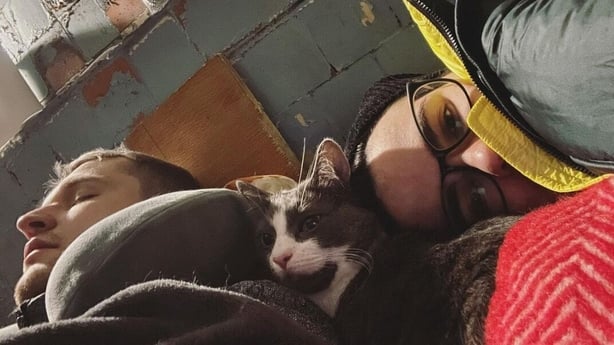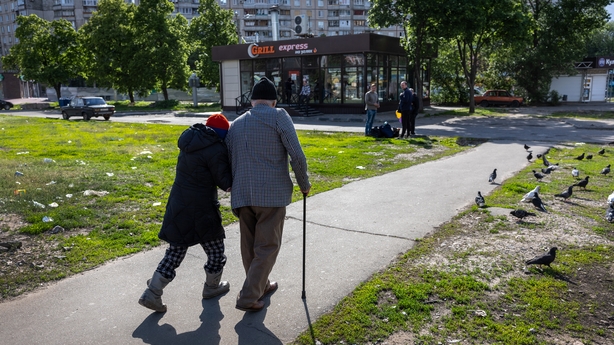Two months sleeping in a basement underneath Kharkiv was only part of the reason why artist Olia Fedorova felt she needed to leave the Ukrainain city this week.
The other reason is that it finally felt safe to do so. Kharkiv has faced heavy bombardment since the beginning of the war, but footage released by the Ukrainian Ministry of Defence earlier this week appeared to show its troops near the Russian border – having pushed their adversaries back.
It is also believed that the Ukrainian army has liberated a number of villages outside Kharkiv that were only recently occupied by Russia.
Olia thus felt the moment was right to exit the country and allow herself time to recuperate.
"This morning we left Kharkiv with my mum and two cats," Olia told Prime Time.
"Then we go to Austria. My mental and physical resources came to an end. I needed to go somewhere else to recharge."
Along with other residents of her apartment block, she had descended underneath the ground floor of the building where she lived after Russia invaded Ukraine on 24 February.

During her time in hiding, Olia would on occasion travel out of the shelter to her mother's home across the city – journeys that were accompanied by the sound of firepower and destruction in the distance.
But, earlier this week, a trip to collect belongings from her mother's home sounded different.
"It was always loud [before], not a moment of silence," she said.
"But then, three days ago, we went there and it was completely silent."
Olia, a conceptual artist, has exhibition work lined up in Austria, but she hopes to return to Kharkiv soon.
Other members of the same basement commune have also left in recent weeks. It now lies dormant.
Similarly, in the Ukrainian capital Kyiv there is some sense of normality returning.
Olena Gnes and her three children now feel comfortable enough to spend most of their day either in their home or outside playing in a local park.
The towering apartment blocks that surround them have seen more activity in recent weeks. Families who vacated their homes in February have slowly started to return.
"Many people came back with their children. We see more vehicles and public transport on the road. However, there is a big shortage of fuel for the cars so there are long queues to buy fuel," Olena said.

"The supermarkets – things like groceries – are available. There are no more long queues for products, for food," she said.
At night, she returns to the shelter nonetheless. It was once full of local residents too afraid to sleep in high-rise buildings.
But now only a handful of people sleep there. Most prefer to stay in their apartments and keep their fingers crossed that the sky above stays clear. It's not a risk Olena is willing to take.
"I'm still sleeping in the shelter and in the daytime I go back home," she said.
"From the morning till the late evening, we are outside, but at night I go back to the shelter because I am afraid to sleep at home with my three children. I am afraid of the air attacks."
She only sees her husband for a few short hours each week. Most of the time, he's defending Kyiv, having joined the territorial army at the outset of the conflict.
"He is fine. We keep in touch. I understand he will not be back home until quite a long time," Olena said.
"I just have to adapt myself to life alone with three children until Russia is defeated and we are back to our normal lives."






